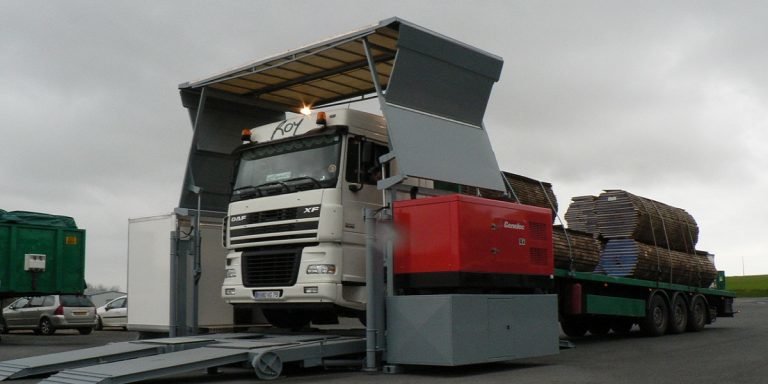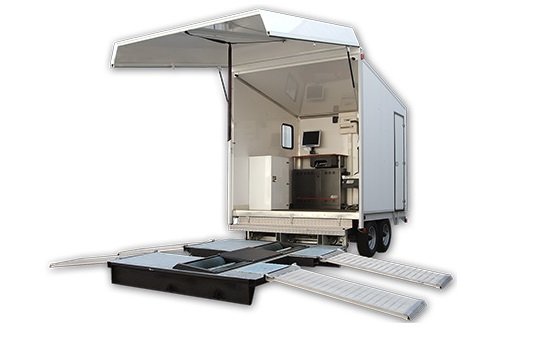IN WHAT WAY ARE MOBILE VEHICLE INSPECTION STATIONS AN ALTERNATIVE TO FIXED CENTRES?
More than 200 ACTIA mobile technical inspection stations are currently operating worldwide. Demand is rising. This may be because ACTIA’s range of mobile stations is the most comprehensive on the market. The range includes five standard models. Each model is adapted to local constraints: the number of vehicles to be checked or climatic conditions. This ample offer reflects ACTIA’s expertise in vehicle inspection equipment. Mobile stations have the same equipment as fixed stations, and of the same quality as fixed stations.

So what influences operators when choosing a mobile station?
SOLVING PROFITABILITY ISSUES
In areas with a low population density, it may be more cost-effective to travel throughout the area with one or more mobile vehicle inspection stations than to install a fixed centre. Building a fixed station in a sparsely populated area can be unprofitable for an operator. The creation of a vehicle inspection centre costs approximately €1m, depending on the country. The imposed frequency of inspection would not be sufficient to generate a volume that would make it profitable to install a fixed centre. A mobile centre is a solution for such configurations: bringing the equipment and the human resources where they are most needed.
Conversely, in certain areas with a high population density, the cost of land and its scarcity are compounded by property taxes that impact the profitability of a fixed centre. In addition come construction costs, delivery times, hidden expenses, construction-site monitoring, etc. Faced with these obstacles, which can become a real headache in some localities, vehicle inspection operators turn to mobile solutions. What is more, mobile stations are also “turnkey” solutions. They are therefore not subject to the same financial, administrative or human constraints.
COVERING ENTIRE ZONES, NOT EXCLUDING ANY MOTORISTS
Set up in strategic transit locations
Mobile stations are a way to reach out to customers who sometimes see this obligation as a burden they are obliged to carry out. Certain operators readily set up inspection campaigns by placing themselves in very busy locations: on a supermarket car park, for example. This strategy pays off and reaches an unwilling population where vehicle inspection is not yet recognised as a necessity that cannot be ignored.
Who would not be tempted to leave their car for its inspection while they go shopping, for example? Providing this service in close proximity to the public is an undeniable incentive.
The same is true for fleets of company vehicles: trucks or buses. The mobile station comes directly to the company’s warehouses and saves the vehicle operator valuable time.
The operator does not need to immobilise their vehicles for several hours at a vehicle inspection centre. As soon as the inspection is completed at the mobile station, the operational vehicle can get back to work. This is an advantage that boosts fleet profitability.

Cover entire zones
In large countries, it is not uncommon to see mobile vehicle inspection stations criss-crossing the country to directly reach customers: private individuals or business fleets. Similarly, the rules also apply to isolated populations and they must also have their vehicles inspected. ACTIA mobile stations installed on board ferries sail around some Mediterranean or Asian archipelagos to carry out inspections on the islanders’ vehicles.
In all countries, vehicle inspections concern every vehicle. There are no exceptions. This is why it is important that even the most isolated motorists also have access to this service. Networking the territory contributes to the generalisation of vehicle inspections. In this sense, mobile stations participate in governments’ efforts to improve road safety across entire territories.
For example, the vehicle inspection of the main components, including brakes, of a truck or bus, can prevent road accidents that endanger not only the driver and passengers, but also other road users.
Benefit from the same quality and reliability as fixed centres
Mobile vehicle inspection stations offer exactly the same quality of service as fixed centres.
ACTIA stations are equipped with the same equipment as stationary centres :
- Side slip testing ;
- Suspension ;
- Pollution ;
- Headlight adjustment ;
- Braking ;
- Axle play detection ;
- Office.
Mobile stations respond to a need to get closer to users, to speed up the process of the inspection, without concessions regarding the effectiveness and reliability of the computerised and automated process. The equipment possesses all the features of permanent stations. They meet the requirements of international standards for inspecting the mechanical condition of automobiles.
ALL ACTIA’S KNOW-HOW WITHIN THE SPACE OF A FEW M2
Easy deployment
With its hydraulic controls, the system is deployed in 10-15 minutes and requires only one operator at the controls. Once deployed, the system offers a side slip tester, a brake test bench, a headlight adjuster, etc. This is exactly the same equipment as a fixed centre. Powered by a generator, its total autonomy ensures that it is permanently operational. A computer connection enables on-site printing of vehicle inspection reports, stickers, at a rate of 30 to 50 vehicles per day.
Inspections for all types of vehicles
Depending on the model, ACTIA mobile stations can cater for all types of vehicles:
- Light vehicles;
- Heavy vehicles;
- Motorcycles, Tricycles, Quads;
- Outsized vehicles: mining vehicles or hydrocarbon transportation, etc.
In fact, ACTIA’s expertise in vehicle inspection benches means that it can provide XXL benches even in mobile configurations!
Compliance with international standards
Mobile stations, just like fixed centres, are subject to the regulations in force in their country. They require regular modifications in line with changing standards. This ever-changing regulatory environment influences the settings and verification of equipment. ACTIA also provides software updates for its mobile equipment, under its international contracts. To guarantee the contractual maintenance of the equipment, ACTIA calls upon its worldwide distribution network.
COMPILE EQUIPMENT TO SUIT SPECIFIC NEEDS
A comprehensive range
ACTIA’s range of mobile vehicle inspection stations includes no less than five models in its catalogue:
- The Trailer station: easily towed by a utility type vehicle. It can be used to inspect light vehicles, motorcycles, tricycles or quads;
- The Container version: suitable for lengthier inspections and can also be transported by any type of pick-up vehicle with a platform that can accommodate a container.
- The Transverse model: with its design and full set of equipment, this station is operational for vehicle inspections in record time. It is also completely autonomous.
- The Lateral model: specially developed for the roadside inspection of both light and heavy vehicles.
- The Ampli-roll station: a compact mobile unit, allowing inspections even in areas that are difficult to access. It can be used to inspect heavy goods vehicles, but also light vehicles and motorcycles.
A modular range
ACTIA mobile stations are also fully customisable. ACTIA is capable of adjusting to specific constraints according to specifications. For example, in a tropical country that experiences heavy rainfall in the monsoon season, specific anti-slip treatments can be provided that are adapted to the access ramps of the inspection area. On the other hand, for stations operating in more arid climates, ACTIA offers a dust-removal solution: very useful after a sandstorm.
Autonomy and additional equipment
Depending on the model, the inspection area may or may not be protected by a roof. Some models also include office space and a living area for nomadic vehicle inspections. The living area includes a sleeping area, a kitchen and a bathroom, like in a mobile home. The choice will depend on the climatic conditions and also on the price, of course.
As we have said, ACTIA is the only equipment supplier to offer such a wide range of mobile vehicle inspection stations. The equipment supplier guides operators in their choice of equipment or customisation options, but also in getting to grips with the equipment. ACTIA provides this support for installation and commissioning all over the world. ACTIA also provides the inspectors with training on all the station’s equipment, either on site or at the ACTIA training centre. Local support is provided by human-scale structures deployed as near as possible to customers, in 140 countries.
www.actia.com

